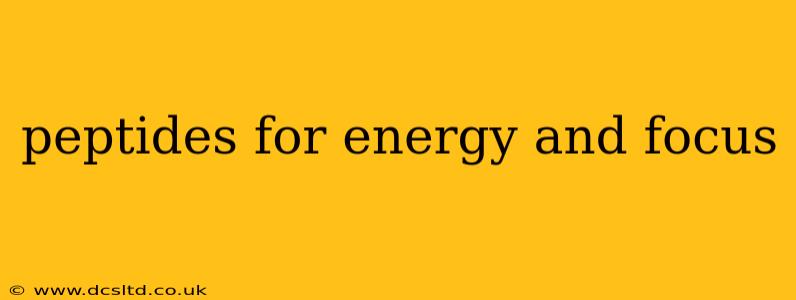Are you looking to boost your energy levels and sharpen your focus? While caffeine and sugary drinks offer a temporary fix, many are exploring the world of peptides for a more sustainable and potentially more effective solution. Peptides, short chains of amino acids, are naturally occurring in the body and play crucial roles in various physiological processes. Specific peptides are now being investigated for their potential to enhance energy, cognitive function, and overall well-being. This article delves into the science behind using peptides to improve energy and focus, exploring the potential benefits, risks, and considerations.
What are Peptides and How Do They Work?
Before diving into specific peptides, let's understand the basics. Peptides are essentially building blocks of proteins. They are smaller than proteins and are easily absorbed by the body. They exert their effects by interacting with specific receptors on cells, triggering various biological pathways. In the context of energy and focus, certain peptides may influence neurotransmitter production, hormone regulation, or cellular metabolism, leading to improvements in these areas. It's important to note that the research on peptide effects is still ongoing, and more studies are needed to fully understand their mechanisms of action and long-term effects.
Which Peptides are Associated with Increased Energy and Focus?
Several peptides are showing promise in preliminary research for boosting energy and focus. However, it's crucial to remember that these findings often come from small studies and require further investigation before widespread acceptance. Some of the most discussed include:
-
GHRP-6 (Growth Hormone Releasing Hexapeptide): This peptide stimulates the release of growth hormone (GH), which plays a role in metabolism, muscle growth, and fat burning. Increased GH levels could indirectly lead to increased energy and improved cognitive function. However, it's important to be aware of the potential side effects associated with GHRP-6, including increased appetite and water retention.
-
PT-141 (Bremelanotide): While primarily known for its potential in treating sexual dysfunction, PT-141 may also have indirect effects on energy levels and mood, potentially improving focus indirectly through improved well-being. More research is needed to solidify these potential benefits.
-
Semax: This peptide is being investigated for its potential neuroprotective and nootropic effects. Preliminary studies suggest that Semax may improve cognitive function, memory, and attention. Its effects on energy levels are less clear, however.
-
Selank: Similar to Semax, Selank is a peptide that shows promise in improving mood, reducing anxiety, and enhancing cognitive performance. These effects could contribute to improved focus and potentially increased energy.
It is crucial to emphasize that the use of these peptides should be under the strict guidance of a qualified healthcare professional. Self-experimentation with peptides can be risky and potentially harmful.
Are Peptides Safe? What are the Potential Side Effects?
The safety and potential side effects of peptides vary depending on the specific peptide, dosage, and individual health status. Some peptides, even those showing potential benefits, may carry risks. Possible side effects can include:
- Increased appetite: Some peptides, like GHRP-6, can stimulate appetite.
- Water retention: Fluid retention is another potential side effect.
- Headaches: Some individuals experience headaches.
- Nausea: Nausea is a possible side effect for certain peptides.
Always consult a physician before using any peptide. They can assess your health status, discuss potential risks and benefits, and help determine if peptides are appropriate for you.
What are the Differences Between Peptides and Other Nootropics?
Many other nootropics (cognitive enhancers) are available, including pharmaceuticals and natural supplements. Compared to other nootropics, peptides offer a potentially unique mechanism of action, targeting specific biological processes. However, because research is limited, the extent of their benefits compared to other nootropics is not fully established. This highlights the importance of consulting a physician for personalized advice.
How Do I Choose the Right Peptide for My Needs?
Choosing the right peptide requires careful consideration and professional guidance. Your doctor can help determine if peptides are appropriate for you and guide you toward the most suitable option based on your individual needs and health profile. They can also monitor your progress and address any side effects.
Where Can I Find Reputable Sources of Peptides?
It is vital to source peptides from reputable suppliers who adhere to strict quality control standards. Avoid purchasing peptides from unregulated sources, as their purity and safety cannot be guaranteed. A physician can often provide guidance on reputable sources if they determine peptide therapy is appropriate for your case.
Disclaimer: This article is for informational purposes only and does not constitute medical advice. Always consult with a qualified healthcare professional before using any peptide or making any changes to your health regimen. The information provided here is based on current research but is not exhaustive and should not be considered a definitive guide.
